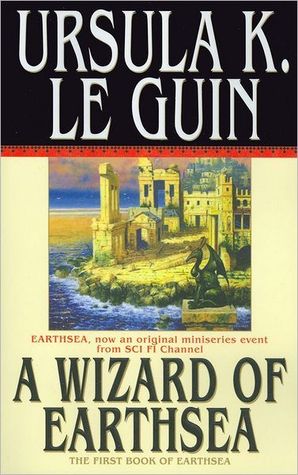A Wizard of Earthsea (Ursula K. Le Guin, 1968) is a high fantasy adventure novel starring the young wizard Ged, following his adventures in the land of Earthsea, a world made up of islands in a vast, endless ocean, and where true names hold ultimate power.
Ged is discovered at a young age to hold grand magical potential, and after eschewing life under master wizard Ogion, soon begins to attend a school for other magically gifted children. Once there he wins rivals, friends, and enemies. At no point does he ride a broomstick or catch the Golden Snitch. But he totally could if he wanted to, because Ged is awesome. All good things must come to an end, and Ged soon earns the ire of an enemy beyond the reckoning of any wizard. Will Ged survive against such a foe? Well, yes, the novel says as much at the very beginning. I guess that kills most of the suspense. But fortunately for the reader, Ged still doesn’t get a free pass. Life isn’t easy for the wizard in training.
Without going into too much detail, there are dragons, shadows, the sea, cataracts, boats, magical duels, sailing, wizard staffs, familiars, more sailing… For a short book, there’s a ton of stuff going on. Thanks in no small part to its variety, A Wizard of Earthsea is an enjoyable book to read. There’s never a dull moment in Ged’s life, or at least in the life we read about. It does not go into great detail regarding his early goat-herding days, for better or worse.
Let’s talk about the exciting stuff. The magic system on Earthsea is interesting. It is based around the idea that everything — animal, vegetable, mineral — has a ‘true name’ that is inherent to the object. This name exists only in an ancient speech, and wizards must call upon these names while casting their spells. Names are given to people by wizards, or rather, their names are revealed. At the time of naming, the child renounces their birth name and embraces their true name. It is then the responsibility of the child to keep this name secret, for those that know it would hold power over them.
Of course, a wizard doesn’t need to know your true name in order to bind your limbs and throw you around like a rag-doll. But to call upon the air and aether to perform such a feat would require great knowledge. So that’s basically how wizards spend their entire life: Learning endless true names to augment what they’re taught at school. The book spends a lot of time banging on about how important names are, and more than a little time impressing upon the reader just how much effort goes into learning such lore.
Despite the effort required to become a powerful wizard being never-ending, Ged doesn’t spend the majority of the story as an ancient, wizened man. This is refreshing, given that wizards in fantasy are stereotyped as old, beardy people, but this trend is bucked in our hero and his classmates. The aged trope is played very straight with his instructors, in all their venerable glory. I feel the younger lead character helps open the novel up to readers who might not usually go for fantasy.
The easier entry is aided by the fact that the novel also avoids being overly grim. Don’t misunderstand, being a fantasy novel there’s always that medieval element of grimness, but for most part the people of Earthsea live pretty swell lives! The townsfolk have their idyllic fishing village lives. The wizards are mostly not jerks, and don’t jealously guard their magic from the masses, preferring to provide services in return for great prestige and privilege. It’s one of the few fantasy worlds where I feel I could make a decent go of it and not die before I hit thirty, even if I wasn’t a super cool wizard like Ged.
Ged meets many people in his journey, including master wizard Ogion, Draco Malfoy-prototype Jasper, the beautiful and mysterious Lady of O… The list goes on and on, and there’s never a character that you’ll confuse for another. You’ll never be left wondering why they Le Guin introduced a character, even when their motives aren’t made clear. For instance, the reader might question why Jasper is such a jerk. It’s never made clear, but any reader would have no trouble piecing together their own back story for Ged’s rival. But he has to be a jerk—for the plot—and he makes a believable one.
The prose itself is wonderful. Le Guin has no problem filling the pages with easy-to-digest writing and subtle foreshadowing. As is typical of older fantasy novels, you aren’t overloaded with dialogue, with world building and story-telling taking centre stage. If you’re someone who needs extensive dialogue to enjoy a book, you might have to give this one a miss. We’re still a decade or two away from talkative fantasy.
I can easily recommend this novel to anyone, doubly so fantasy fans, triply so to younger readers who want an entry into the genre. There’s many more novels in the series, but A Wizard of Earthsea can be read standalone with no feelings of being short-changed. It’ll only take you a couple of evenings, and they’ll be well-spent!
— Matthew







